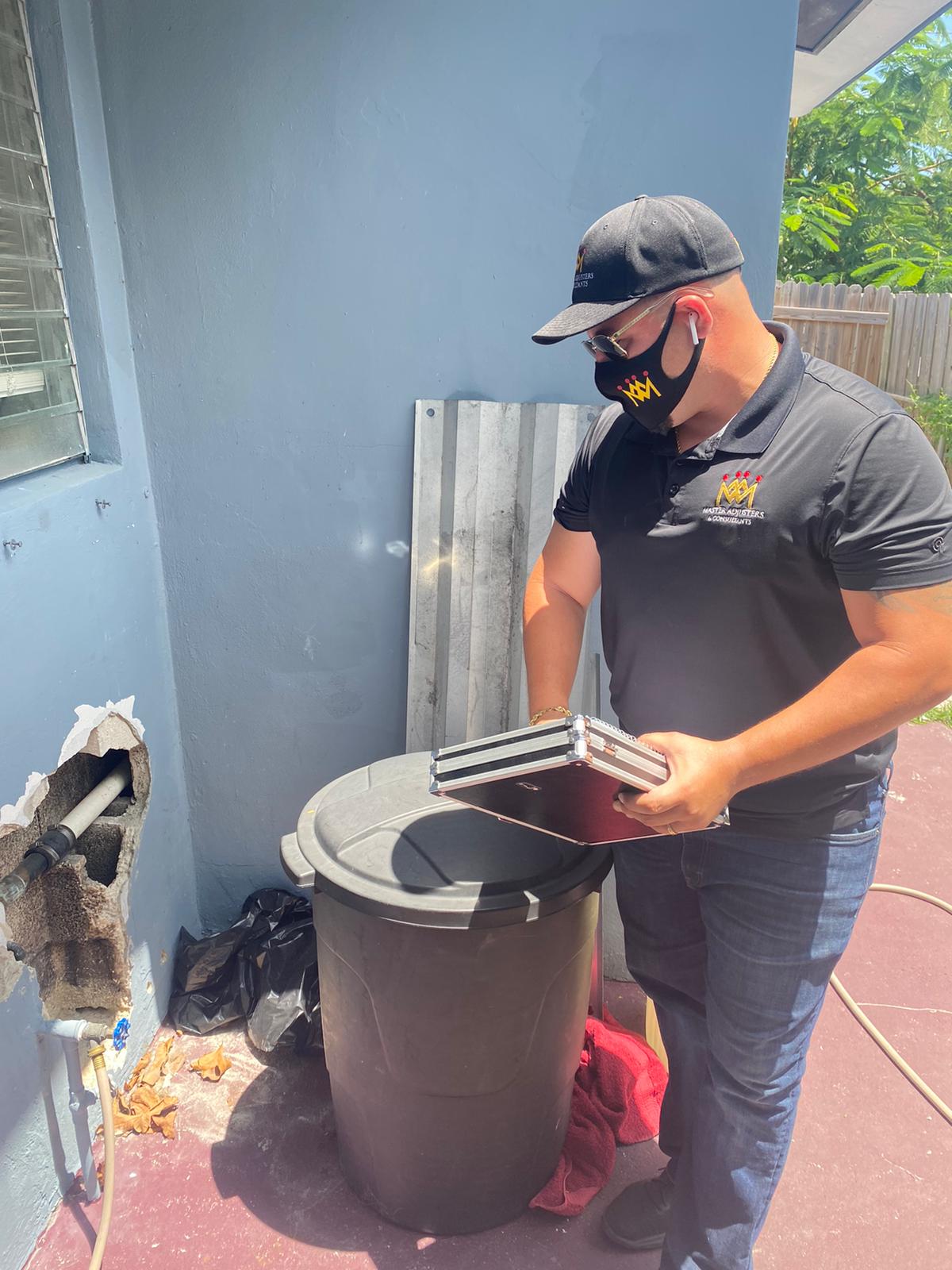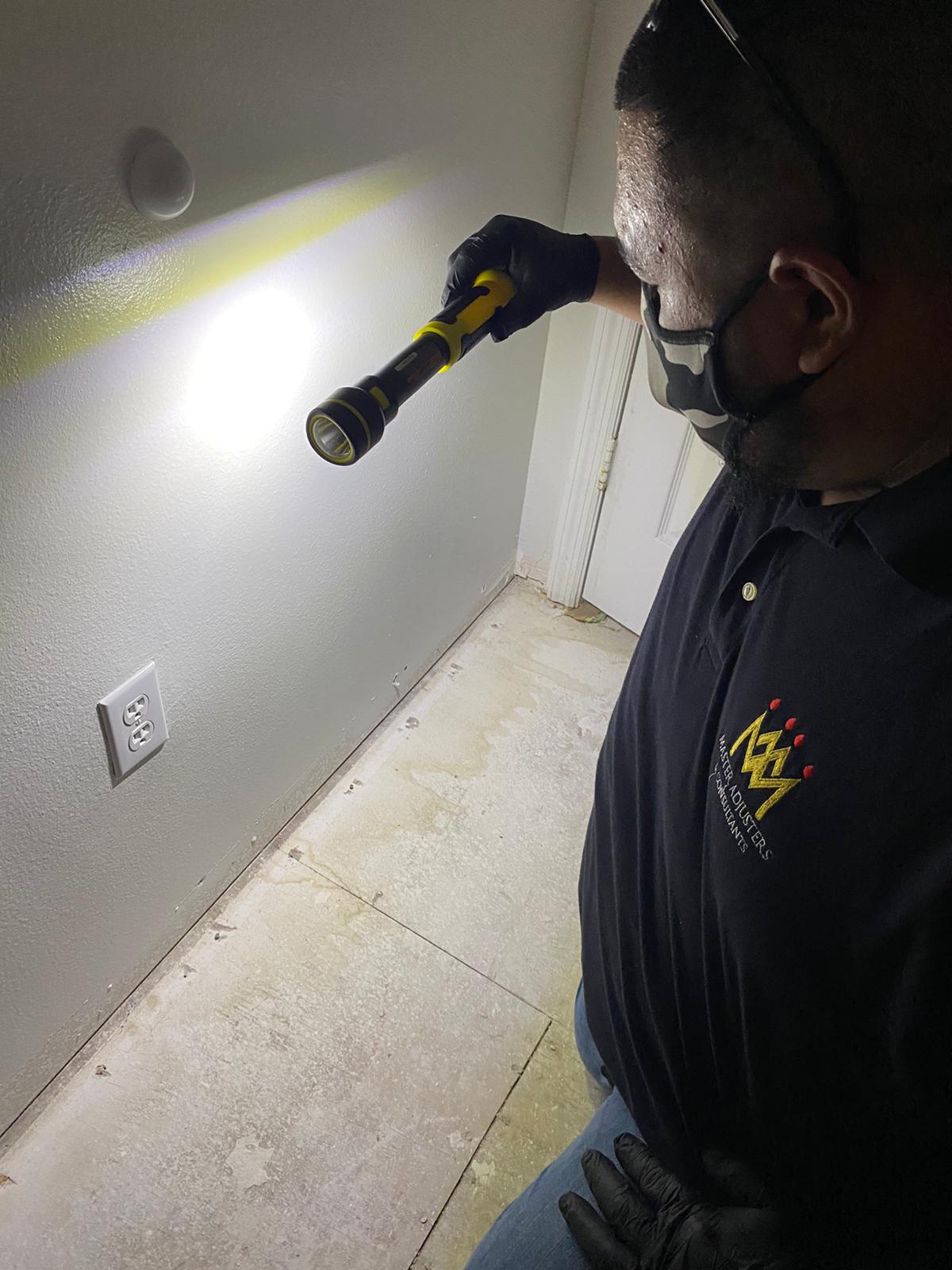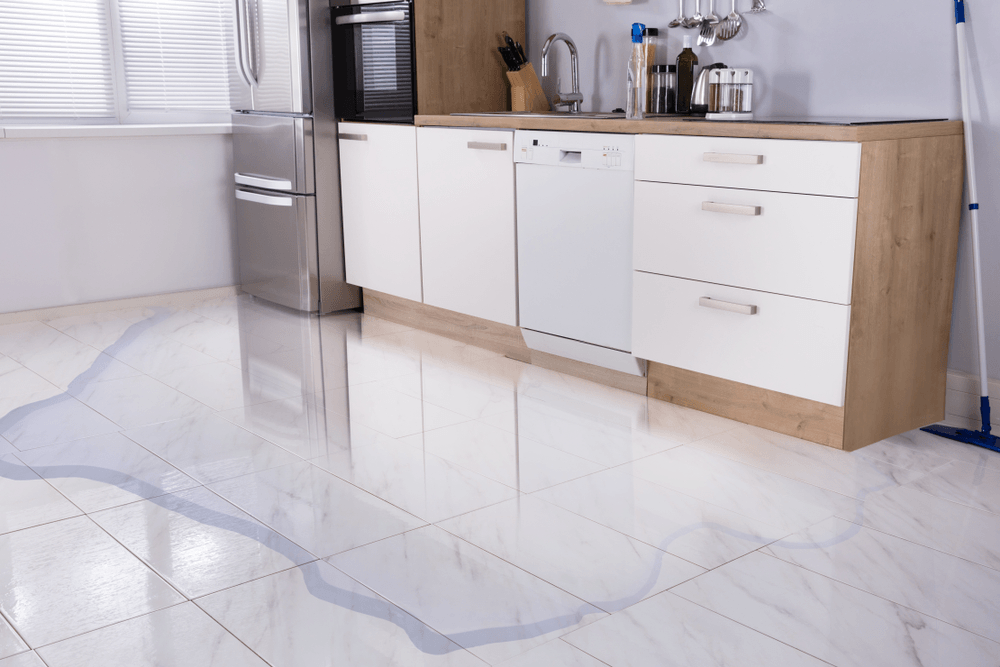
MASTER ADJUSTERS
& CONSULTANTS
Public Insurance Adjusters Serving Florida
Water Damage Insurance Claim
Water Damage
Insurance Claims
It’s not hard to understand that most people do not understand the affects of water damage or even understand the insurance claim process itself.
Get Started
Get Started
Drop us a line and we’ll get back to you!
Contact Us
Thank you for contacting us.
We will get back to you as soon as possible.
We will get back to you as soon as possible.
Oops, there was an error sending your message.
Please try again later.
Please try again later.
Free Inspection
Free Inspection
Receive a Check
Receive a Check
No Upfront Fees
No Upfront Fees
A Powerful Ally
A Powerful Ally
Water & Flood Damage Insurance ClaimsFrequently Asked Questions:
Water & Flood Damage Insurance Claims
Frequently Asked Questions:
Q: A water pipe on the second floor burst causing a flood of water throughout my home. Is this a flood loss?
A: No, this is defined as a water loss and would not be covered under the NFIP.
Q: Is water seeping through the exterior of my home and flooding the inside a flood loss?
A: No, unless the NFIP definition of a flood is met.
Q: Would the loss above be covered under my homeowner’s policy as a water loss?
A: Probably not as there may be exclusions for water that seeps through walls.
Q: If a building is damaged, is putting a blower and mopping up the water all that is necessary?
A: Probably not, each water loss is fact specific and needs to be looked at and managed by a trained public adjuster that represents your interests.
Q: If mold grows on wet walls and we have a mold exclusion or limitation are we going to be out-of-pocket for the repairs/replacement?
A: If the building surface was damaged by water, it is a water loss. The mold is considered a manifestation of a water loss. Remove all water damaged items which include the mold damage. We would and have argued that all water damaged building material has to be taken out because of water (which came first) and this includes the mold growing on the water damaged surface.
Q: What’s is generally covered under Building Property coverage?
A: Remember that every policy is different and must be reviewed by an experienced claims adjuster to specifically define your coverage. In general the following items would be covered:
· The insured building and its foundation
· The electrical and plumbing systems
· Central air conditioning equipment, furnaces, and water heaters.
· Refrigerators, cooking stoves, and built-in appliances such as dishwashers.
· Permanently installed carpeting over an unfinished floor.
· Permanently installed paneling, wallboard, bookcases, and cabinets.
· Window blinds.
· Detached garages (up to 10 percent of Building Property coverage). Detached buildings (other than garages) require a separate Building Property policy.
· Debris removal.
Q: What’s generally covered under Personal Property coverage?
A: Personal belongings such as clothing, furniture, and electronic equipment
· Curtains
· Portable and window air conditioners
· Portable microwave ovens and portable dishwashers
· Carpets not included in building coverage (see above)
· Clothes washers and dryers
· Food freezers and the food in them
· Certain valuable items such as original artwork and furs (up to $2,500)
Q: What is generally not covered under a policy?
A:
· Damage caused by moisture, mildew, or mold that could have been avoided by the property owner
· Currency, precious metals, and valuable papers such as stock certificates.
· Property and belongings outside of a building such as trees, plants, wells, septic systems, walks, decks, patios, fences, seawalls, hot tubs, and swimming pools.
· Living expenses such as temporary housing.
· Financial losses caused by business interruption or loss of use of insured property.
· Most self-propelled vehicles such as cars, including their parts (see Section IV.5 in your policy).
Q: How are flood damages generally valued?
A:
There are 2 types of valuations: Replacement Cost Value (RCV)
or Actual Cash Value (ACV)
Replacement Cost Value (RCV)
represents the cost to replace that part of a building that is damaged (without depreciation). To be eligible, three conditions must be met:
1. The building must be a single-family dwelling, and
2. Be your principal residence, meaning you live there at least 80 percent of the year, and
3. Your building coverage is at least 80 percent of the full replacement cost of the building, or is the maximum available for the property under the NFIP.
Actual Cash Value (ACV)
represents the Replacement Cost Value at the time of loss, less the value of its physical depreciation. Some building items such as carpeting are always adjusted on an ACV basis. For example, wall-to-wall carpeting could lose between 10–14 percent of its value each year, depending on the quality of the carpeting. This depreciation would be factored in the adjustment. Personal property is always valued at ACV.
Q: What is Increased Cost of Compliance (ICC) coverage?
A: Most NFIP policies include ICC coverage, which applies when flood damages are severe. ICC coverage provides up to $30,000 of the cost to elevate, demolish, or relocate your home. If your community declares your home "substantially damaged" or "repetitively damaged" by a flood, it will require you to bring your home up to current community standards.
The total amount of your building claim and ICC claim cannot exceed the maximum limit for Building Property coverage ($250,000 for a single-family home). Having an ICC claim does not affect a Personal Property claim (up to $100,000), which is paid separately.
Water damage and flood losses, can be very challenging for commercial and residential property owners alike. Please consider seeking the assistance of a trained and experienced public adjuster at Master Adjusters & Consultants to help you navigate the property claims challenges that are likely to arise.

Qualified Water Damage and Flood Damage Insurance Claims Representatives
Qualified Water Damage
and Flood Damage
Insurance Claims Representatives
It’s not hard to understand that most people do not understand the affects of water damage or even understand the insurance claim process itself.
Simply, because it’s something that you may only go through once in a lifetime. It’s for this reason you should have professionals assisting you with such damage. If improperly handled, water can cause significant and costly damages and/or sickness in your home or building. There are different types of water as well as different levels of damage to consider.
- Category 1: Fresh Water from a busted pipe, uncontaminated.
- Category 2: Dirty Water from a washing machine, dishwasher, slightly contaminated.
- Category 3: Black Water from dirty toilet, entry from outside of home, highly contaminated.
All water can become contaminated in as little as a few hours depending on the circumstances. Yes, even fresh, clean water can affect the health of your home and family if not addressed and treated properly.
Fresh water can become Black Water rather quickly. The process of handling each Category of water is completely different and requires special care and treatment. Black Water from sewage carries several toxins that are released in your home or business. When your insurance adjuster suggests that you merely need to dry this type of
moisture, you’re putting people at risk without consulting a professional.
So, again, most people have had no prior experience in how to handle an insurance claim, their policy and its language can be very confusing and frustrating to deal with. To obtain fair and accurate compensation for your insurance claim, it is highly recommended to discus your situation with an experienced claim professional that can advise you of all your options. With such, you will be able to make informed, educated decisions on how to move forward and how to obtain the maximum payout you are entitled to for your loss.
Finally, the mere fact that water damage claims are the most frequent type of insurance claim submitted to carriers nationwide and are also the most costly to the insurance industry, we are noticing more and more insurance companies attempting to shift costs to the policyholder. They are generating cleaver ways to do so even knowing that their policies cover these losses. There is even a new tactic of inserting language in the policy that states any water loss reported after a period of 14 days will be excluded from coverage. Does this sound as if your insurance company is looking out for your best interests? If your water damage claim has coverage from days one through thirteen, how can the insurance company say that your water damage is NOT covered after that. This can be devastating to a policyholder. Get assistance! Do not attempt to battle this type of scrupulous activity on your own.
Contact Us
Thank you for contacting us.
We will get back to you as soon as possible.
We will get back to you as soon as possible.
Oops, there was an error sending your message.
Please try again later.
Please try again later.
Serving All Cities Including:
Doral | Hialeah | Hialeah Gardens | Cutler Bay | Kendall | South Miami | Homestead | Westchester |
Punta Gorda | Lehigh Acres | North Ft Myers | Cape Coral | Port Charlotte







